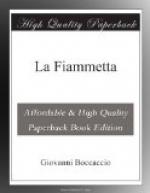No translation into English of La Fiammetta has been made since Shakespeare’s time—when a small edition was published, which is now so rare as to be practically unattainable—until the appearance of the present Scholarly and poetic rendering, which places within the reach of all one of the world’s greatest masterpieces of literature.
D.K.R.
PROLOGUE
Beginneth the Book called Elegy of Madonna Fiammetta, sent by her to Ladies in Love.
When the wretched perceive or feel that their woes arouse compassion, their longing to give vent to their anguish is thereby increased. And so, since, from long usance, the cause of my anguish, instead of growing less, has become greater, the wish has come to me, noble ladies—in whose hearts, mayhap, abides a love more fortunate than mine—to win your pity, if I may, by telling the tale of my sorrows. Nor is it at all my intent that these my words should come to the ears of men. Nay, rather would I, so far as lies in my power, withhold my complaints from them; for, such bitterness has the discovery of the unkindness of one man stirred in me, that, imagining all other men to be like him, methinks I should be a witness of their mocking laughter rather than of their pitying tears. You alone do I entreat to peruse my story, knowing full well that you will feel with me, and that you have a pious concern for others’ pangs. Here you will not find Grecian fables adorned with many lies, nor Trojan battles, foul with blood and gore, but amorous sentiments fed with torturing desires. Here will appear before your very eyes the dolorous tears, the impetuous sighs, the heart-breaking words, the stormy thoughts, which have harrowed me with an ever-recurring goad, and have torn away from me sleep and appetite and the pleasant times of old, and my much-loved beauty. When you behold these things, and behold them with the ardent feelings which ladies are wont to have, sure I am that the cheeks of each separately, and of all when brought together, will be bathed in tears, because of those ills which are alone the occasion of my never-ending misery. Do not, I beseech you, refuse me these tears, reflecting that your estate is unstable as well as mine, and that, should it ever come to resemble mine (the which may God forfend!), the tears that others shed for you will be pleasing to you in return. And that the time may pass more rapidly in speaking than in, weeping, I will do my best to fulfil my promise briefly, beginning with that love which was more happy than lasting, so that, by comparing that happiness with my present case, you may learn that I am now more unhappy than any woman ever has been. And afterward I will trace with mournful pen, as best I can, all the agonies which are justly the source of my lamentations. But first, if the prayers of the wretched are heard, if there is in Heaven any Deity whose holy mind can be touched with compassion for me, afflicted as I am, bathed in my own tears, Him I beseech to aid my despondent memory and support my trembling hand in its present task. So may the tortures which I have felt and still feel in my soul become fruitful, and the memory will suggest the words for them, and the hand, more eager than apt for such duty, will write them down.




